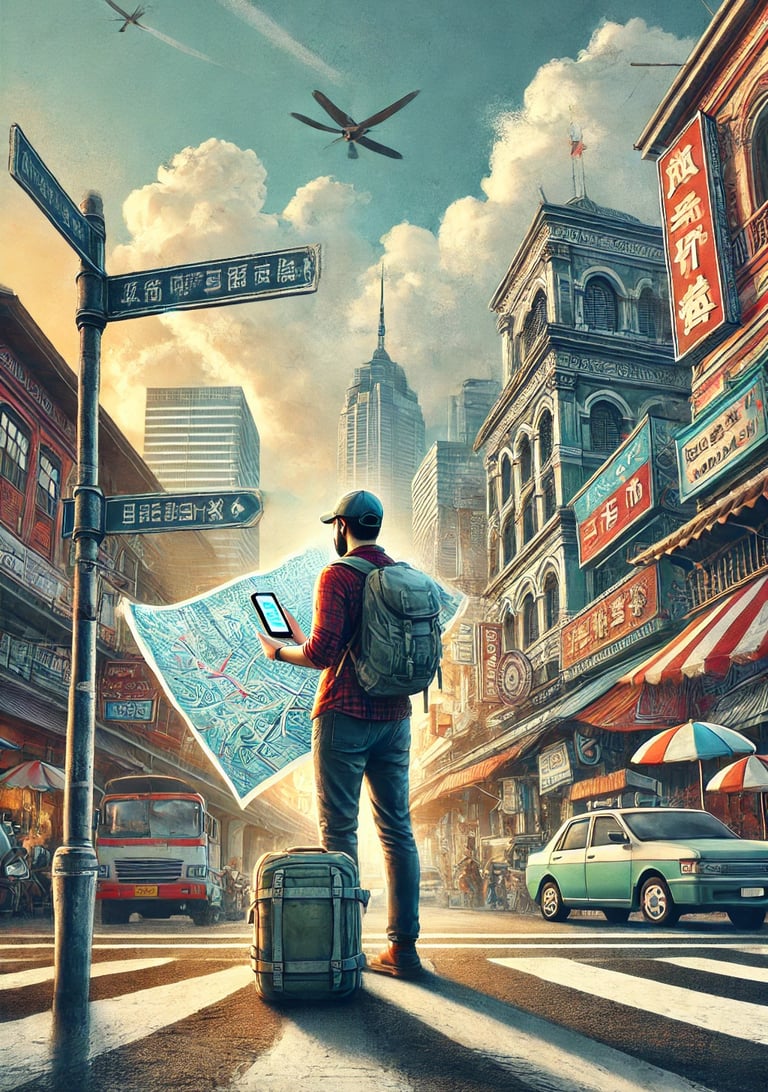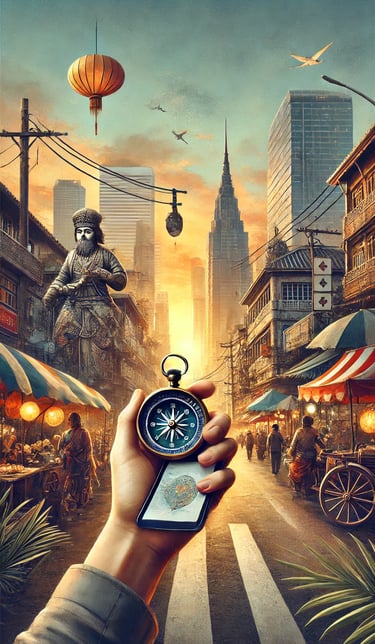Rediscovering the Art of Travel in the Age of Hyperconnectivity
In today’s hyperconnected world, the way we travel has undergone a profound transformation. With smartphones, GPS, local SIM cards, and constant Wi-Fi availability, we are never truly disconnected, even when venturing far from home. Modern technology has undoubtedly enhanced the safety and convenience of travel, enabling us to remain in constant contact with loved ones and access information at our fingertips. But amidst this sea of connectivity, one cannot help but wonder: what has been lost in the process? Has technology stripped away the essence of exploration and discovery?
1/10/20253 min read


The Illusion of Discovery
Travel was once an act of stepping into the unknown. It meant navigating unfamiliar streets using paper maps, asking locals for directions, and relying on intuition to uncover hidden gems. Today, GPS and Google Maps ensure we never get lost, and online reviews tell us exactly where to eat, what to see, and how to spend our time. While this eliminates guesswork, it also removes the serendipity that often leads to the most memorable travel experiences.
In the past, getting lost was not necessarily a bad thing—it was part of the adventure. Wandering through alleyways or stumbling upon an unexpected market could lead to interactions with locals and moments of awe. Now, with every step mapped out in advance, spontaneity is often sacrificed for efficiency.
The Digital Safety Net
Undoubtedly, modern technology has made travel safer. Real-time location sharing and tracking devices like AirTags provide peace of mind to both travelers and their families. Emergencies can be handled swiftly with instant communication, and translation apps bridge language gaps effortlessly.
However, this digital safety net can also create a false sense of security, making travelers overly reliant on devices rather than their instincts. The thrill of navigating an unfamiliar place without technological aids has been replaced by the reassurance of constant connectivity. While safety should never be undervalued, there is a fine line between preparedness and over-dependence.
The Risk of Superficial Experiences
Technology allows us to simulate experiences without fully engaging in them. Virtual tours, travel vlogs, and social media posts often serve as substitutes for firsthand exploration. Even while traveling, it is tempting to spend more time documenting experiences than living them.
Consider the analogy of Google Street View. Through our phones, we can preview every street and landmark before arriving, reducing the sense of wonder upon seeing them in person. Similarly, ordering authentic cuisine at a local restaurant abroad can feel no different than ordering it from a foreign restaurant back home, especially when reviews dictate our choices rather than curiosity.
Reclaiming the Essence of Travel
So, how can modern travelers reclaim the authentic experience of exploring unknown lands? Here are some practical strategies:
Disconnect to Reconnect – Set boundaries for technology use. Allocate specific times for checking messages or updating loved ones, but keep your phone on airplane mode while exploring. This forces you to rely on observation and interaction rather than digital tools.
Get Lost on Purpose – Put away your GPS and maps for a day. Wander aimlessly through neighborhoods, allowing yourself to stumble upon unexpected places and encounters. Trust your instincts and embrace the unknown.
Talk to Locals – Resist the urge to Google every question and instead approach locals for recommendations. Ask for their favorite cafés, markets, or scenic spots. These personal interactions often lead to deeper cultural insights than online reviews ever could.
Learn Basic Phrases – Rather than relying entirely on translation apps, learn a few key phrases in the local language. It shows respect and often opens doors to more meaningful connections.
Limit Social Media Use – Avoid the trap of curating your trip for others. Instead, focus on immersing yourself in the moment. Take photos, but resist the urge to post immediately. Let the experience sink in before sharing it online.
Choose Experiences Over Convenience – Opt for local buses instead of ride-hailing apps, walk instead of taking taxis, and shop at street markets instead of supermarkets. These choices may be less efficient, but they are infinitely richer in experience.
Stay in Homestays or Guesthouses – Large hotels often isolate travelers from the local culture. Choosing smaller, family-run accommodations fosters connections with hosts who can share personal stories and tips about the area.
Limit Pre-Planning – Leave parts of your itinerary open to chance. Avoid booking every activity in advance, allowing room for spontaneous discoveries and changes of plan.
Balancing Technology and Exploration
Of course, this is not to suggest that modern tools should be abandoned altogether. They play an undeniable role in enhancing safety, accessibility, and convenience. The challenge is finding a balance—using technology as a support rather than a crutch.
For instance, carrying a GPS device as a backup while relying primarily on a paper map can offer security without compromising adventure. Similarly, using translation apps sparingly while attempting to communicate in the local language preserves both convenience and authenticity.


Final Thoughts
Travel in the modern age is a paradox. We have never been more connected, yet this very connectivity risks isolating us from the raw and unfiltered experiences that make travel so transformative. The question is not whether technology should be abandoned but how it can be integrated thoughtfully to preserve the magic of exploration.
By taking deliberate steps to disconnect, embrace uncertainty, and interact with locals, travelers can recapture the sense of wonder that once defined journeys into the unknown. In doing so, we can ensure that travel remains not just a physical movement across borders but a profound and enriching journey of the soul.
Itineround
Discover itineraries and maps of world cities.
email - itineround@gmail.com
© 2024. All rights reserved.